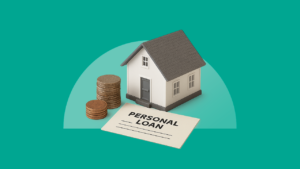5 ways a personal loan could help you save money

Key takeaways
- Personal loans can help you save money on interest, increase the value of your home through a renovation project and much more.
- If you consolidate debt with a personal loan, the new loan’s rate must be lower than your original rates to save on interest.
- If you have bad or fair credit, you may want to build your credit and pay down other debts before applying.
Personal loans typically have more competitive interest rates than other lending products, such as credit cards, credit card cash advances and sometimes even mortgages. If you qualify for a personal loan with a good rate, you could save money, and the fast funding turnaround could save you time.
A low-interest debt consolidation loan may put more money in your pocket if you use it to pay off high-interest credit card debt. A personal loan may also be a cheaper alternative to finance a large purchase like an RV or boat or to renovate your home without the paperwork hassle of home loans.
If used correctly, it could even be a tool to improve your credit score. Learning how a personal loan can save money may help you accomplish more financial goals.
1. Consolidate credit card debt
The most common way a personal loan can save you money is to consolidate high-interest credit card debt. The average credit card currently has an interest rate of over percent, while the average personal loan interest rate is under 12.5 percent.
However, borrowers with excellent credit may qualify for rates below 7 percent. A debt consolidation loan typically only makes sense if you can get a lower rate than you currently pay.
If you don’t have time to wait until your score improves and need to tackle debt fast, applying with a cosigner or co-borrower with good credit could increase your chances of getting the best rates.
How consolidating debt saves money
Consolidating credit card debt — and other debts — into a single loan with a lower interest rate reduces the interest you pay each month and over the life of the loan. Because it’s installment debt, you can’t reuse it (like you can with credit cards), forcing you to pay the balance off.
2. Improve your home without high mortgage closing costs
You’ll typically spend 3 to 5 percent of the amount you borrow on a home equity loan, HELOC or cash-out refinance toward mortgage closing costs. That’s a big chunk of change compared to many personal loan home improvement lenders that don’t charge fees.
Despite three Fed rate cuts last year, mortgage rates remain stubbornly high — even higher than excellent credit personal loan rates with some lenders. And if you need quick cash to make some repairs a buyer is asking for to complete the sale of your home, you can typically have funds within a business day with a personal loan.
That’s much faster than the 30 to 45 days it can take to get funds from a mortgage loan. Personal loans are also unsecured, which means you don’t risk losing your home if you fall on hard times and can’t repay the loan.
How personal loans for home improvement save you money
Lower rates and no-fee loans are just a few ways a personal loan can save you money if you’re improving your home. The quick access to cash could help you avoid costly delays on a major renovation. Because the loans are not secured, you won’t have to get approval from your lender for any cost overrides, extra draw requests or home inspections.
3. Finance a big expense
Most lenders let you use a personal loan for almost anything. The loan proceeds can pay for a vacation, wedding, boat, one-time medical procedure or even business start-up costs. Standard restrictions include higher education expenses, gambling and illegal activities.
You can also borrow up to $100,000, making it a good alternative to home equity loans that tie up the wealth you’ve built in your home. One of the advantages of personal loans is you receive all the funds at once and know your monthly payment from the outset. As a result, you may be more strict about your budget for a big-ticket item.
That could help you avoid the uncertainty of using a credit card for major purchases. Credit cards make overspending easy, especially on major events like weddings or vacations. You aren’t as likely to track the total amount you spend with each swipe and won’t know the resulting monthly payment until the spending is done.
How financing a big expense with a personal loan saves money
One of the primary pros of financing a major expense with a personal loan is being able to calculate your monthly payment in advance of the purchase. You can use a personal loan calculator to find the right payment, with terms as short as one year or as long as 7 years. Some lenders even allow you to stretch the payment out to 12 years for expensive boat or RV purchases.
4. Increase your credit score
This money-saving feature often goes hand in hand with consolidating credit card debt. Your credit utilization ratio measures how much – or little – of your available credit is currently being used.
A personal loan can boost your credit score if you reduce your credit utilization ratio by paying your credit card balances down or in full. There is a catch though: You have to minimize or avoid using credit cards in the future.
If you have little or no credit history, a personal loan could also be a great tool to boost your credit. It will contribute to your credit mix and payment history, which both account for 45 percent of your credit score.
How increasing your credit score saves money
Increasing your credit score allows you to qualify for more competitive interest rates when you borrow money in the future. This can positively affect the rate you qualify for on a mortgage, car loan, or other loan product. It may even affect your home or car insurance premiums.
5. Avoid pesky fees – if you qualify
Many credit products, such as credit cards, balance transfer cards and mortgages charge a variety of different types of fees. If you’ve managed your credit exceptionally well, you may have a good shot at qualifying for a no-fee personal loan. The best way to tell if you’re paying fees is to compare your APR to your offered rate. If they’re the same, you’re probably not being charged any fees.
Be aware, though, that fee-free lenders typically require excellent credit and a stable source of income for you to qualify. And while these lenders don’t charge an application or origination fee, they might still charge a late fee if you aren’t on time with your payment.
How avoiding fees saves money
Fees cut into the benefit of any type of credit you take out. If you don’t qualify for no-fee personal loans, you may have fees of up to 10 percent deducted from your loan proceeds. Always shop around with at least three different lenders to get the lowest rate and fees, and don’t be afraid to walk away from a lender that charges you fees at the last minute.
When should you use a personal loan?
Whether a personal loan is a good idea depends on your financial situation and goals.
In general, it’s a good idea if:
- You can cut down on high-interest debt with a debt consolidation loan.
- You want to finance a project that adds value to your home without touching your home’s equity.
- You have a stable job and very little other debt.
It may not be a good idea to choose a personal loan if:
- You qualify for a cheaper financial product, like a 0 percent APR credit card.
- You don’t have a stable income or have bad credit.
- You need the flexibility of a minimum monthly payment or need to use the credit for ongoing expenses.
Bottom line
Personal loans can save you money if you have the financial stability to repay them and can use all the funds you borrow at once. They can be a source of quick funding for a variety of different purposes.
However, it’s best to consider alternatives to personal loans that may also save you money. As with any big financial decision, shop top lenders and don’t sign anything that you don’t fully understand.
Why we ask for feedback Your feedback helps us improve our content and services. It takes less than a minute to complete.
Your responses are anonymous and will only be used for improving our website.
You may also like

Can I get a personal loan to buy a house?

7 personal loan mistakes that could cost you money

Business loan vs. personal loan: What’s the difference?

How to boost your personal loan approval odds: 5 tips



